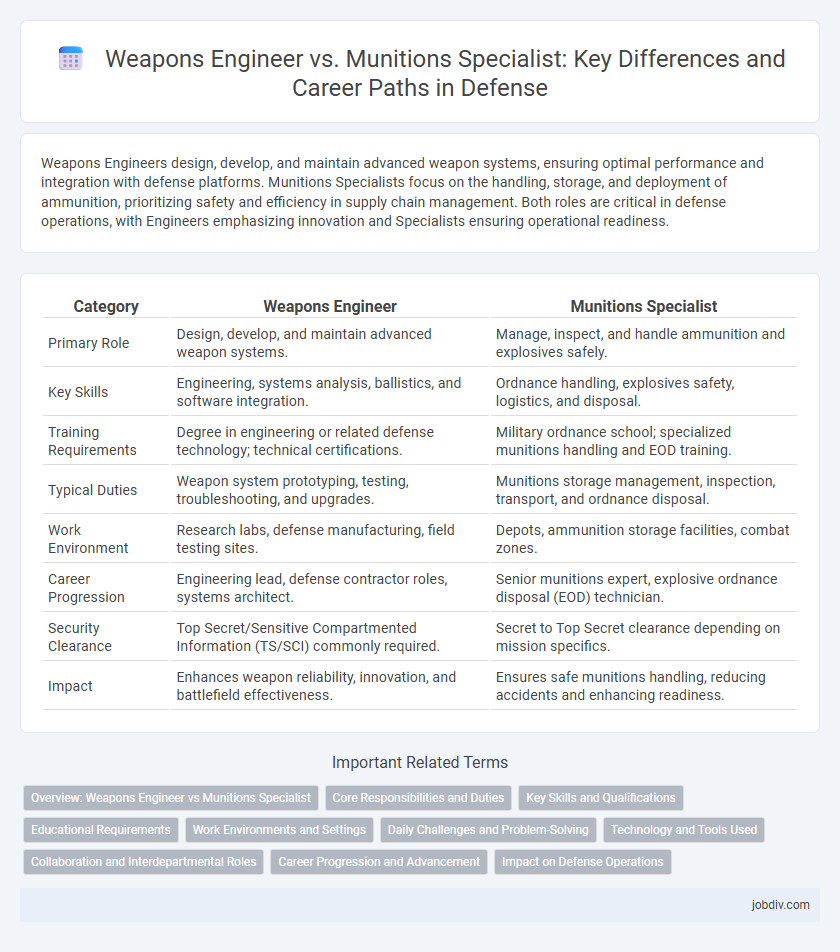Weapons Engineers design, develop, and maintain advanced weapon systems, ensuring optimal performance and integration with defense platforms. Munitions Specialists focus on the handling, storage, and deployment of ammunition, prioritizing safety and efficiency in supply chain management. Both roles are critical in defense operations, with Engineers emphasizing innovation and Specialists ensuring operational readiness.
Table of Comparison
| Category | Weapons Engineer | Munitions Specialist |
|---|---|---|
| Primary Role | Design, develop, and maintain advanced weapon systems. | Manage, inspect, and handle ammunition and explosives safely. |
| Key Skills | Engineering, systems analysis, ballistics, and software integration. | Ordnance handling, explosives safety, logistics, and disposal. |
| Training Requirements | Degree in engineering or related defense technology; technical certifications. | Military ordnance school; specialized munitions handling and EOD training. |
| Typical Duties | Weapon system prototyping, testing, troubleshooting, and upgrades. | Munitions storage management, inspection, transport, and ordnance disposal. |
| Work Environment | Research labs, defense manufacturing, field testing sites. | Depots, ammunition storage facilities, combat zones. |
| Career Progression | Engineering lead, defense contractor roles, systems architect. | Senior munitions expert, explosive ordnance disposal (EOD) technician. |
| Security Clearance | Top Secret/Sensitive Compartmented Information (TS/SCI) commonly required. | Secret to Top Secret clearance depending on mission specifics. |
| Impact | Enhances weapon reliability, innovation, and battlefield effectiveness. | Ensures safe munitions handling, reducing accidents and enhancing readiness. |
Overview: Weapons Engineer vs Munitions Specialist
Weapons engineers design, develop, and test advanced weapon systems, focusing on the integration of technology and materials to enhance performance and safety. Munitions specialists manage the storage, handling, and deployment of ammunition and explosives, ensuring operational readiness and adherence to safety protocols. Both roles are critical in defense operations but emphasize different expertise: engineering innovation versus munitions management.
Core Responsibilities and Duties
Weapons Engineers design, develop, and test advanced weapon systems, ensuring their reliability, functionality, and integration with defense technologies. Munitions Specialists handle the storage, inspection, maintenance, and safe disposal of explosive devices and ammunition, emphasizing safety protocols and regulatory compliance. Both roles are critical in defense operations but differ in technical focus, with engineers concentrating on creation and innovation, and specialists on management and safety of munitions.
Key Skills and Qualifications
Weapons Engineers possess advanced knowledge in mechanical and electronic systems, specializing in the design, development, and testing of weaponry with proficiency in CAD software and materials science. Munitions Specialists focus on the handling, storage, and disposal of explosive ordnance, requiring expertise in safety protocols, explosive chemistry, and regulatory compliance. Both roles demand strong analytical skills and attention to detail, but Weapons Engineers prioritize engineering principles while Munitions Specialists emphasize operational safety and ordnance management.
Educational Requirements
Weapons Engineers typically require a bachelor's degree in mechanical engineering, aerospace engineering, or a related field, often supplemented with specialized training in weapon systems design and ballistics. Munitions Specialists usually need a high school diploma or equivalent, combined with extensive hands-on training and certification in explosives handling, storage, and disposal. Advanced degrees and technical certifications significantly enhance career prospects and expertise for both roles within defense sectors.
Work Environments and Settings
Weapons Engineers typically operate in research labs, testing facilities, and defense contractor sites where they design and develop advanced weapon systems. Munitions Specialists work primarily in military bases, storage depots, and field environments managing, inspecting, and maintaining explosive ordnance and ammunition. Both roles demand strict adherence to safety protocols but differ significantly in their daily work settings and operational focus within the defense sector.
Daily Challenges and Problem-Solving
Weapons Engineers tackle complex design flaws and system malfunctions, ensuring reliability and safety in cutting-edge military technology. Munitions Specialists focus on the precise handling, storage, and disposal of explosive ordnance, managing risks associated with volatile materials. Both professions demand acute problem-solving skills under pressure, addressing daily challenges that safeguard operational effectiveness and personnel safety.
Technology and Tools Used
Weapons Engineers utilize advanced computer-aided design (CAD) software, ballistic simulation tools, and robotics to develop and refine weapon systems, emphasizing innovation in materials and electronics integration. Munitions Specialists rely on diagnostic equipment, explosive ordnance disposal (EOD) robots, and specialized detection devices to handle, maintain, and safely neutralize explosive devices and ammunition. Both roles leverage cutting-edge technology, but Weapons Engineers focus on creation and enhancement, whereas Munitions Specialists prioritize operational safety and disposal.
Collaboration and Interdepartmental Roles
Weapons Engineers design and innovate advanced weapon systems by applying principles of physics and materials science, ensuring optimal performance and safety. Munitions Specialists focus on the handling, storage, and deployment of ammunition, emphasizing strict adherence to safety protocols and operational readiness. Their collaboration enhances weapon system reliability by integrating engineering designs with practical munitions management, facilitating seamless interdepartmental coordination in defense operations.
Career Progression and Advancement
Weapons Engineers typically advance by developing expertise in designing and improving weapon systems, often moving into senior engineering roles, project management, or research and development positions within defense organizations. Munitions Specialists progress through gaining experience in handling, inspecting, and maintaining munitions, frequently advancing to supervisory roles, safety officers, or logistics coordinators responsible for ammunition supply chains. Career advancement for Weapons Engineers often requires advanced degrees and technical certifications, while Munitions Specialists benefit from specialized training and field certifications in explosive ordnance handling and safety protocols.
Impact on Defense Operations
Weapons Engineers design and develop advanced weaponry systems, ensuring technological superiority and enhanced combat effectiveness in defense operations. Munitions Specialists manage the storage, handling, and deployment of explosives and ammunition, maintaining operational safety and reliability on the battlefield. Together, their expertise directly influences mission success by optimizing weapon performance and ensuring the secure utilization of munitions.
Weapons Engineer vs Munitions Specialist Infographic

 jobdiv.com
jobdiv.com